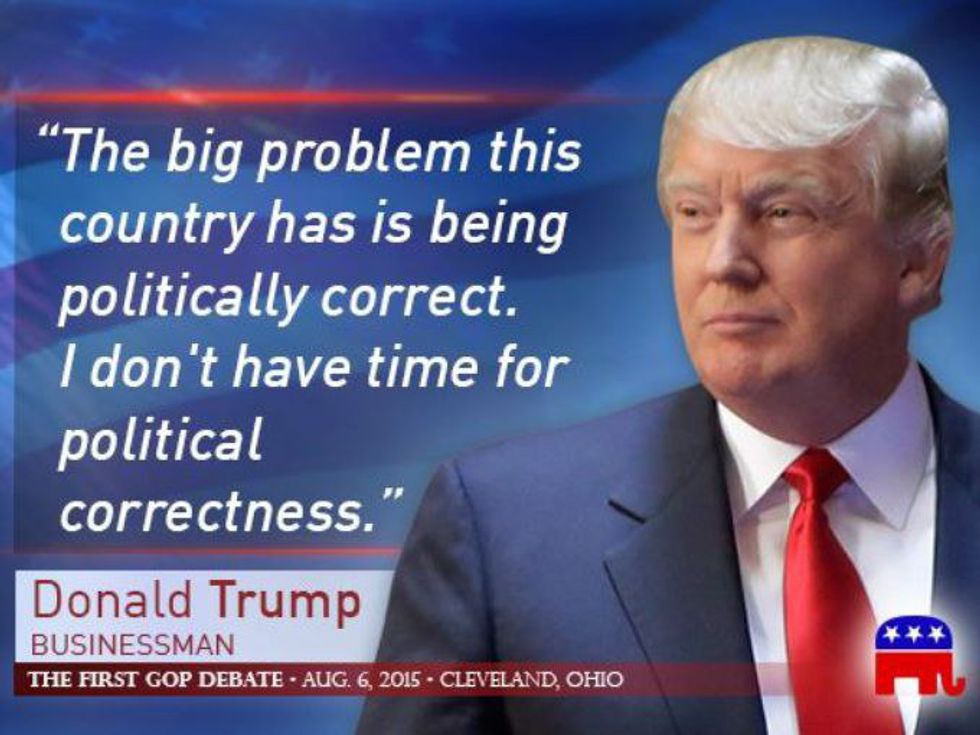In today's society, the pro-political correctness movement has slowly gained more traction and support among Millennials. Though maybe not in the eyes of all, but for a majority of those who have joined the ongoing debate concerning political correctness; this is a sigh of relief.
However, this is not a battle that can be given up on simply because of achieving a small amount of victory. In today's society, there are still masses of people who feel as though there are more vital international and global issues to be dealt with before worrying about being respectful to others. As long as political correctness and its definition has been coined, there has perpetually been an influx of arguments against what it stands for. Too often, it is looked at as more of a method of limiting one's constitutionally-given right to free speech and less of simply being mindful of minority groups; which should not even be too much a favor to ask for. The reasoning against political correctness is consistently weak, and deserves to be disproven for the flawed argument that it is.
1. "Political correctness is a direct threat to my First Amendment right to freedom of speech."
For starters, why is being mindful and respectful to members of minority groups such a loss to one's mindset anyways? Political correctness may sound scary for some, but in reality, the dictionary definition is, "conforming to a belief that languages and practices which offend political sensibilities (as in matters of race or sex) should be eliminated." Meaning that, yes, one can certainly disagree with this concept. In the U.S., where the Constitution is consistently upheld, one will not receive any sort of capital punishment for simply being offensive. Frowned upon, yes; but not put behind bars. Freedom of speech means that the government cannot silence one's voice if he or she wishes to utilize it as a form of negative and hurtful expression, but at the same time, society reserves the right to largely disapprove of ones' expressed negative and hurtful expression. Freedom is not being compromised, simply the respect others may have for someone who openly doesn't care for political correctness. But, someone so willing to offend others probably doesn't care about his/her reputation they may have among others because respect shouldn't be much of a priority, right?
2. "There are more imperative issues occurring in today's world than worrying about being kind to everyone."
If we are not respectful and considerate as a nation, then how can we expect to accurately go about fixing the "more imperative issues?" If we are so closed-mindedly quick to put the word "Islamic" in front of the word "terrorism," then we miss out on the knowledge of the existent non-Islamic terrorism, which is, in fact, the majority of occurring terrorism. Furthermore, respect is one of the things we can accomplish along the way when dealing with the "more important things going on". If one lacks the ability to show decency to a minority group in which they are not a member of, then how does one plan to create real solutions without ostracizing the groups one is being blatantly disrespectful towards? The ceasing of looking at political correctness as something scarier than simply being respectful is the first step in moving on and focusing on other international and global issues at hand.
3. "Having to be politically correct is like constantly walking on eggshells. This generation is too sensitive."
Having to hear one be disgustingly offensive to a minority group isn't exactly a walk in the park either. In the grand scheme of things, being accepting of those with different lifestyles than your own is no different than opening the door for someone in a public place. You offer a kind gesture, the person appreciates said gesture, and you both go on with your day. This action did not in any way hinder your life, and it only made someone else's a little bit easier. Being respectful to another culture or the opposite gender is just the same. However, this is not to say that you absolutely had to open the door for the stranger. You could have slammed the door on that person and walked away as he/she stands there in shock and disbelief, and quite possibly, anger. It is no surprise that offending someone's culture or sex would probably produce the same affect on the other person in the interaction. Being offensive is not prohibited by law in any way shape or form, as it shouldn't be; but when one chooses to be openly insulting, he or she ought to be prepared for the possible repercussions of their actions. It is a pretty easy concept -- one that is learned at a juvenile age; nobody likes to be hurt and offended. Some may even react when hurt and offended.
The concept of political correctness is seeping into present-day society, mostly promoted by Millennials. All around the country, there have been widespread protests and arguments against offensive statements a public figure may have stated about a specific minority group. Though allowed, it should be seen as a positive, progressive change in society that this kind of negativity is no longer tolerated.
It is time that America must finally dissect the true meaning of being politically correct and remove the inappropriate assumption that nothing good will ever come out of being tolerant of and coexisting with members of minority groups. A healthier, more positive society to dwell in is a more prosperous one. To shut down the dream of future generations to live in a world where they will no longer be discriminated against is both despicable and closed-minded. Your freedom of speech rights will perpetually live on in the U.S. as long as the Constitution is adhered to, but hopefully, the bigotry and sexism that is so commonly seen will die a quick and painful death.










































